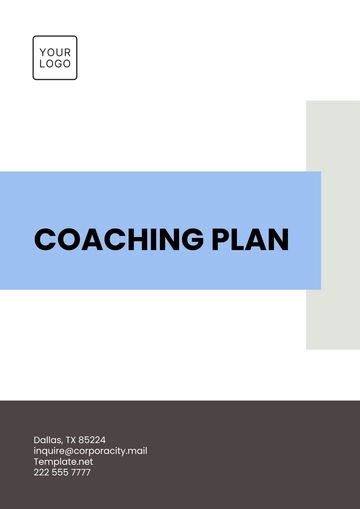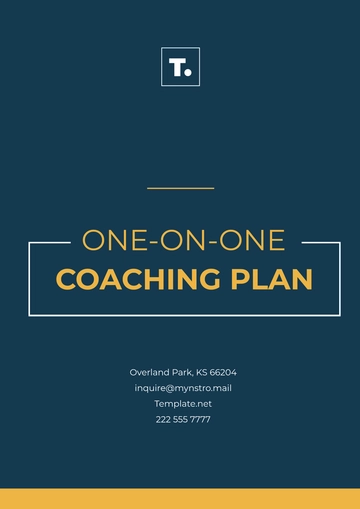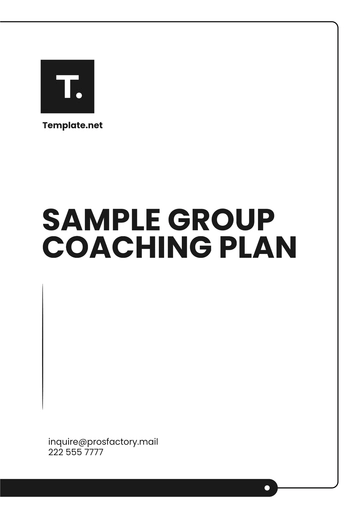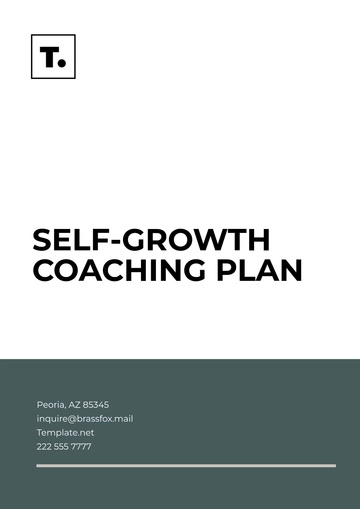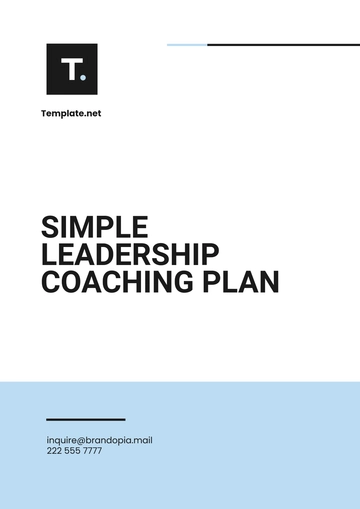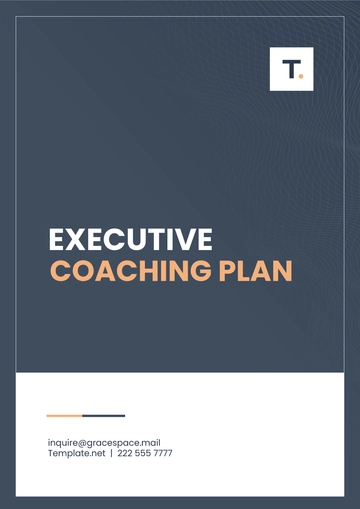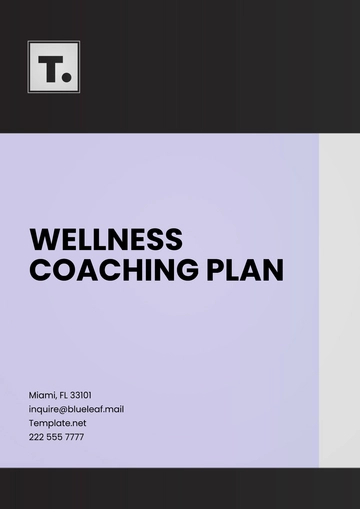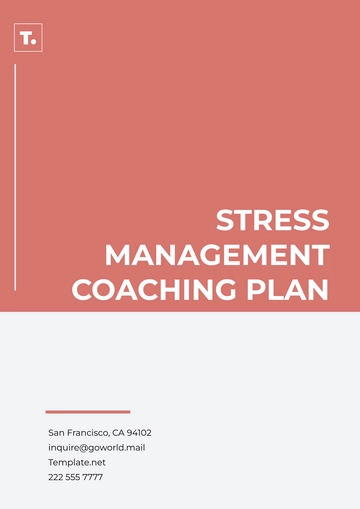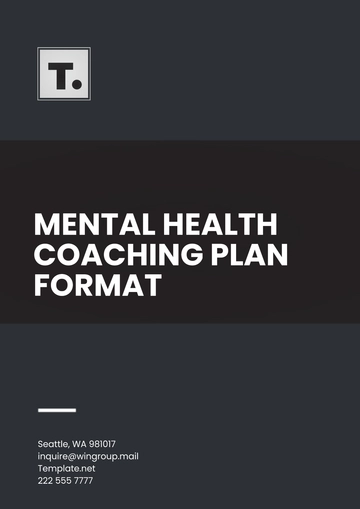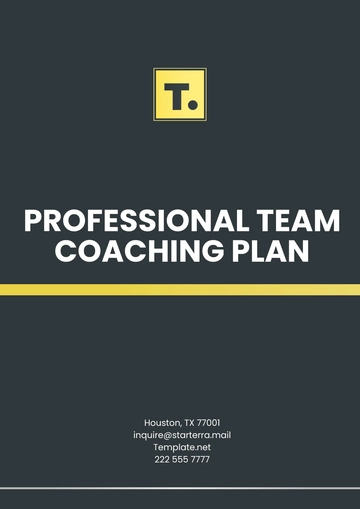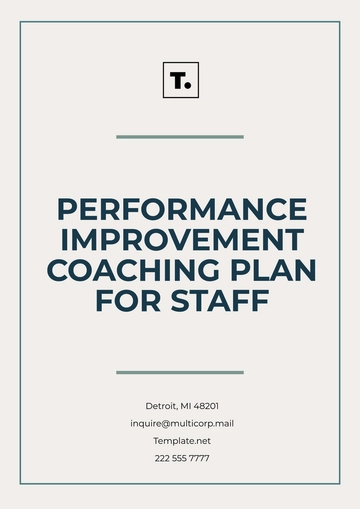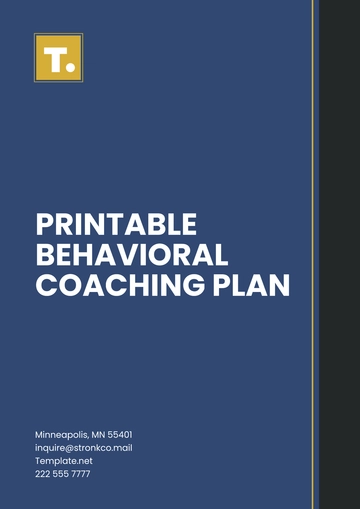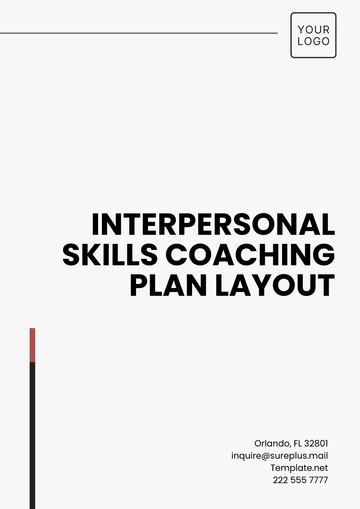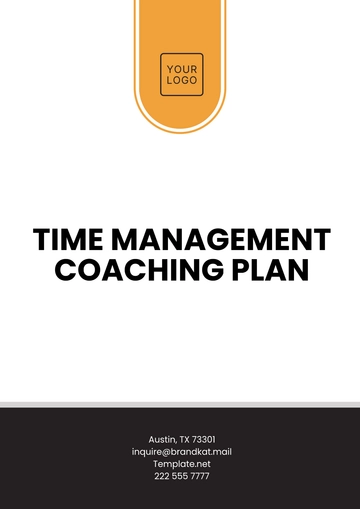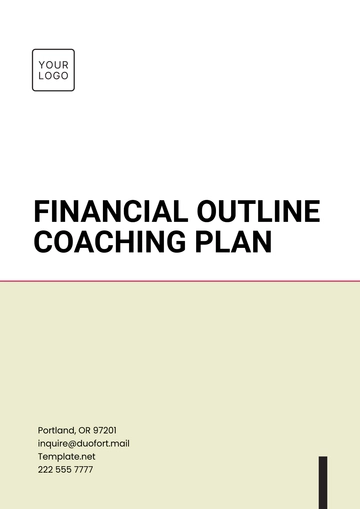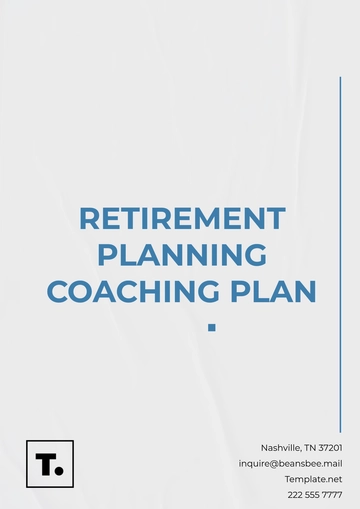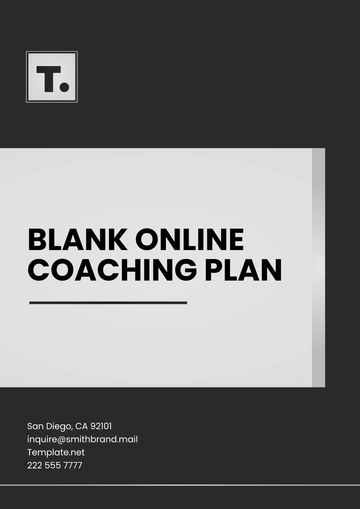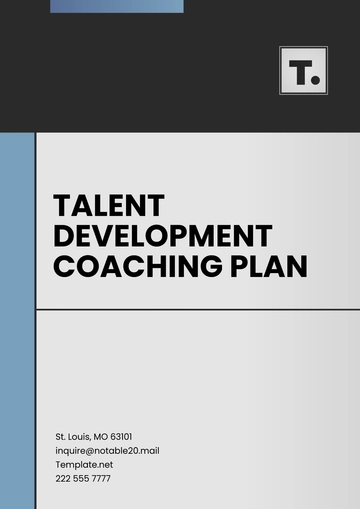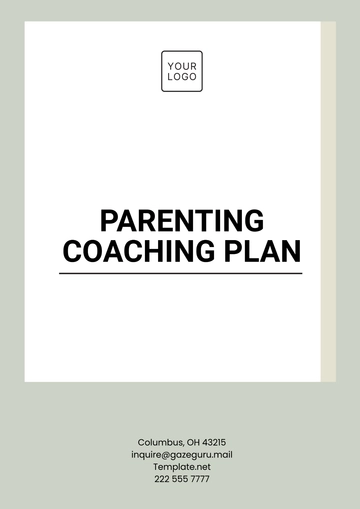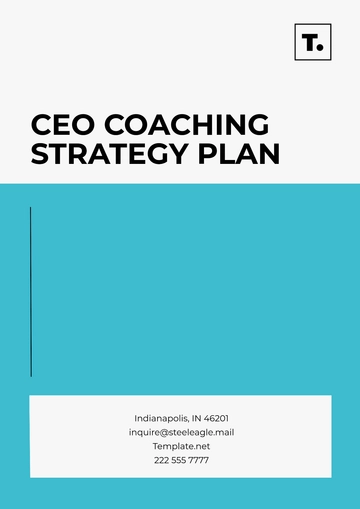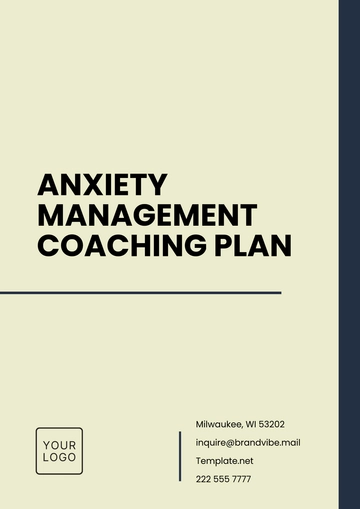Free Anxiety Management Coaching Plan
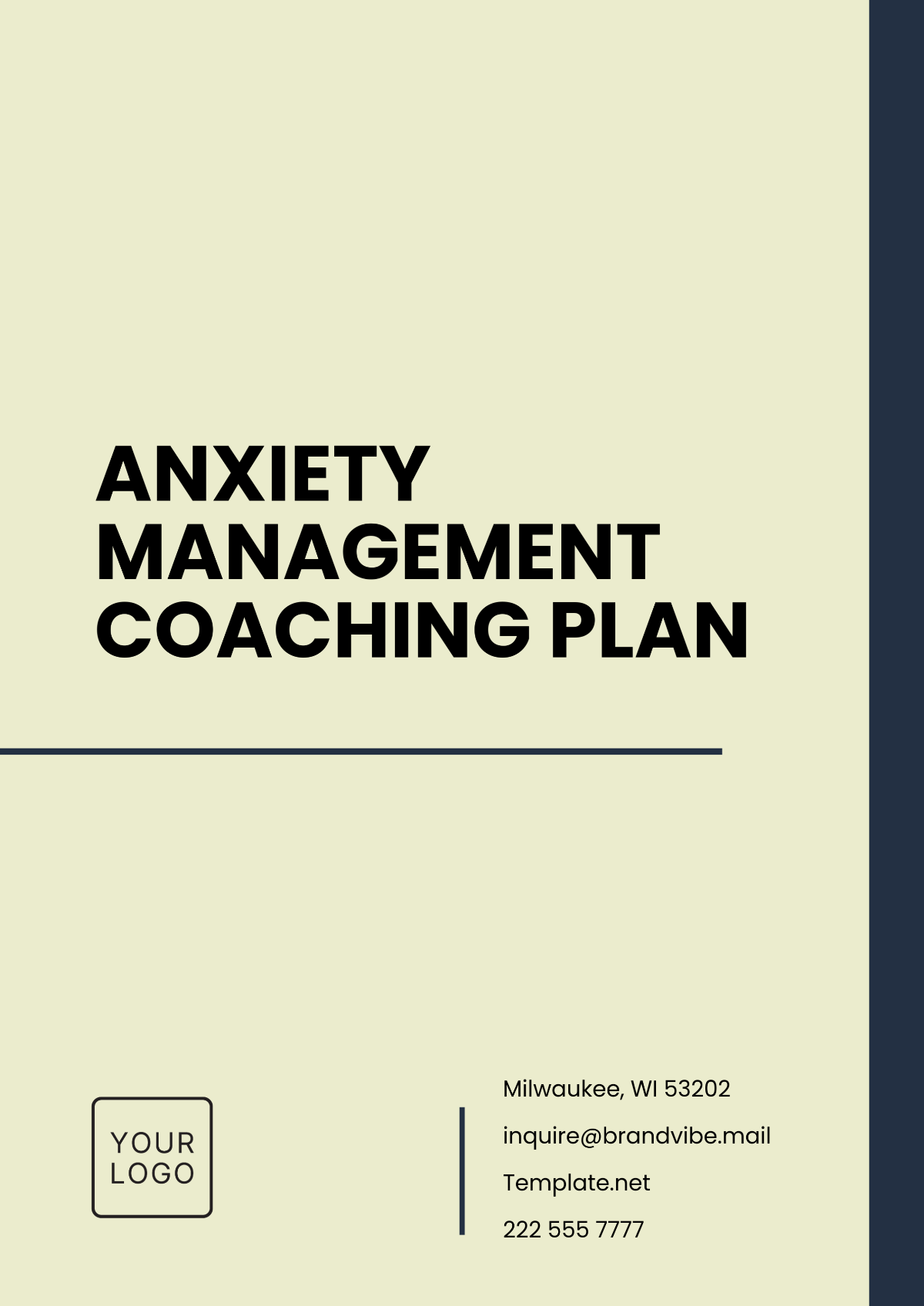
Prepared by: [Your Name]
Date: [Date]
I. Introduction
This Anxiety Management Coaching Plan is designed to help Carmel Ryan manage and reduce symptoms of anxiety. The plan focuses on providing practical tools, techniques, and exercises to enhance emotional well-being and resilience. Our goal is to empower the client to gain control over their anxiety and improve their overall quality of life.
II. Goals
The primary goals of this coaching plan are:
To reduce the frequency and intensity of anxiety episodes.
To build coping skills that can be applied in daily life situations.
To increase self-awareness and understanding of personal triggers.
To improve overall mental health and emotional regulation.
III. Strategies and Techniques
This section outlines various strategies and techniques that will be implemented to achieve the goals outlined above.
A. Relaxation Techniques
Deep Breathing Exercises: Practice slow, deep breaths to calm the nervous system.
Progressive Muscle Relaxation (PMR): Focus on tensing and relaxing muscle groups to reduce physical tension.
B. Cognitive Behavioral Techniques (CBT)
Cognitive Restructuring: Identify and challenge negative thought patterns that fuel anxiety.
Thought Stopping: Learn how to interrupt anxious thoughts with a positive statement or affirmation.
C. Mindfulness and Meditation
Mindfulness Meditation: Engage in daily mindfulness exercises to help stay present and reduce worry.
Body Scan: Perform a full-body scan to identify areas of tension and relax them.
D. Exposure Therapy
Gradual Exposure: Gradually face anxiety-provoking situations in a controlled and safe manner to reduce fear over time.
IV. Action Plan
This section outlines specific steps the client will take to manage anxiety, which will be reviewed and adjusted regularly.
A. Weekly Schedule
Monday: Practice 10 minutes of deep breathing in the morning.
Wednesday: Engage in a 20-minute mindfulness meditation session.
Friday: Write in a journal about any anxiety-triggering events and how they were managed.
B. Behavioral Changes
Tracking Triggers: Maintain a daily log to identify and understand anxiety triggers.
Self-Reflection: At the end of each week, reflect on progress made and areas that need further attention.
V. Monitoring and Progress Evaluation
This section describes how the client’s progress will be tracked and evaluated.
A. Progress Check-ins
Weekly Sessions: Regular coaching sessions to assess progress, discuss challenges, and adjust the plan as needed.
Monthly Review: A more in-depth review of the client’s anxiety levels, coping strategies, and goals.
B. Feedback and Adjustments
Client Feedback: The client will provide input on what techniques are most helpful and where they feel improvement is needed.
Plan Adjustments: Based on feedback, the plan may be modified to better suit the client’s needs and goals.
VI. Support Resources
Additional tools and resources to support the client’s anxiety management journey.
A. Recommended Apps and Tools
Headspace: For guided meditation and mindfulness practices.
Calm: For relaxation exercises and sleep aids.
B. Professional Support
Therapist Referral: In cases where deeper therapeutic work is needed, a referral to a licensed therapist specializing in anxiety disorders may be provided.
C. Support Groups
Online Support Communities: Connect with others who are managing anxiety for mutual support and shared experiences.
- 100% Customizable, free editor
- Access 1 Million+ Templates, photo’s & graphics
- Download or share as a template
- Click and replace photos, graphics, text, backgrounds
- Resize, crop, AI write & more
- Access advanced editor
Help clients manage anxiety with the Anxiety Management Coaching Plan Template from Template.net. This editable and customizable template helps coaches create personalized plans focused on coping mechanisms, mindfulness, and emotional support. Use our Ai Editor Tool to easily modify the plan to address specific anxiety triggers and needs. Whether working with individuals or groups, this plan provides a clear structure to support anxiety management and emotional well-being.
You may also like
- Finance Plan
- Construction Plan
- Sales Plan
- Development Plan
- Career Plan
- Budget Plan
- HR Plan
- Education Plan
- Transition Plan
- Work Plan
- Training Plan
- Communication Plan
- Operation Plan
- Health And Safety Plan
- Strategy Plan
- Professional Development Plan
- Advertising Plan
- Risk Management Plan
- Restaurant Plan
- School Plan
- Nursing Home Patient Care Plan
- Nursing Care Plan
- Plan Event
- Startup Plan
- Social Media Plan
- Staffing Plan
- Annual Plan
- Content Plan
- Payment Plan
- Implementation Plan
- Hotel Plan
- Workout Plan
- Accounting Plan
- Campaign Plan
- Essay Plan
- 30 60 90 Day Plan
- Research Plan
- Recruitment Plan
- 90 Day Plan
- Quarterly Plan
- Emergency Plan
- 5 Year Plan
- Gym Plan
- Personal Plan
- IT and Software Plan
- Treatment Plan
- Real Estate Plan
- Law Firm Plan
- Healthcare Plan
- Improvement Plan
- Media Plan
- 5 Year Business Plan
- Learning Plan
- Marketing Campaign Plan
- Travel Agency Plan
- Cleaning Services Plan
- Interior Design Plan
- Performance Plan
- PR Plan
- Birth Plan
- Life Plan
- SEO Plan
- Disaster Recovery Plan
- Continuity Plan
- Launch Plan
- Legal Plan
- Behavior Plan
- Performance Improvement Plan
- Salon Plan
- Security Plan
- Security Management Plan
- Employee Development Plan
- Quality Plan
- Service Improvement Plan
- Growth Plan
- Incident Response Plan
- Basketball Plan
- Emergency Action Plan
- Product Launch Plan
- Spa Plan
- Employee Training Plan
- Data Analysis Plan
- Employee Action Plan
- Territory Plan
- Audit Plan
- Classroom Plan
- Activity Plan
- Parenting Plan
- Care Plan
- Project Execution Plan
- Exercise Plan
- Internship Plan
- Software Development Plan
- Continuous Improvement Plan
- Leave Plan
- 90 Day Sales Plan
- Advertising Agency Plan
- Employee Transition Plan
- Smart Action Plan
- Workplace Safety Plan
- Behavior Change Plan
- Contingency Plan
- Continuity of Operations Plan
- Health Plan
- Quality Control Plan
- Self Plan
- Sports Development Plan
- Change Management Plan
- Ecommerce Plan
- Personal Financial Plan
- Process Improvement Plan
- 30-60-90 Day Sales Plan
- Crisis Management Plan
- Engagement Plan
- Execution Plan
- Pandemic Plan
- Quality Assurance Plan
- Service Continuity Plan
- Agile Project Plan
- Fundraising Plan
- Job Transition Plan
- Asset Maintenance Plan
- Maintenance Plan
- Software Test Plan
- Staff Training and Development Plan
- 3 Year Plan
- Brand Activation Plan
- Release Plan
- Resource Plan
- Risk Mitigation Plan
- Teacher Plan
- 30 60 90 Day Plan for New Manager
- Food Safety Plan
- Food Truck Plan
- Hiring Plan
- Quality Management Plan
- Wellness Plan
- Behavior Intervention Plan
- Bonus Plan
- Investment Plan
- Maternity Leave Plan
- Pandemic Response Plan
- Succession Planning
- Coaching Plan
- Configuration Management Plan
- Remote Work Plan
- Self Care Plan
- Teaching Plan
- 100-Day Plan
- HACCP Plan
- Student Plan
- Sustainability Plan
- 30 60 90 Day Plan for Interview
- Access Plan
- Site Specific Safety Plan
